最新倒装句讲解及练习
(英语)英语倒装句技巧和方法完整版及练习题含解析
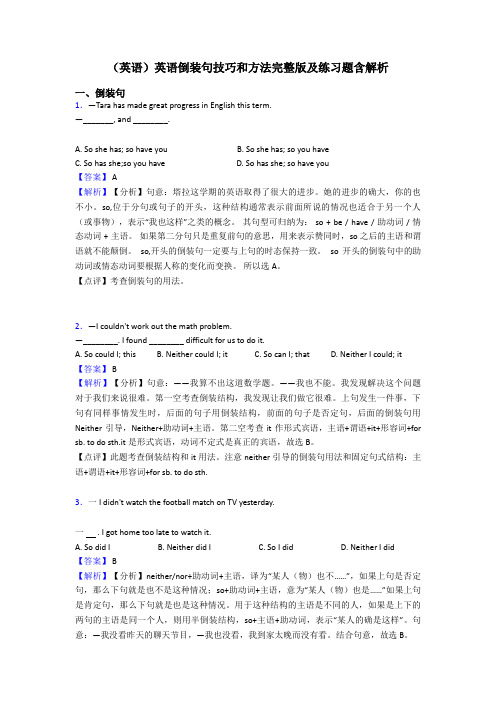
(英语)英语倒装句技巧和方法完整版及练习题含解析一、倒装句1.—Tara has made great progress in English this term.—_______, and ________.A. So she has; so have youB. So she has; so you haveC. So has she;so you haveD. So has she; so have you【答案】 A【解析】【分析】句意:塔拉这学期的英语取得了很大的进步。
她的进步的确大,你的也不小。
so,位于分句或句子的开头,这种结构通常表示前面所说的情况也适合于另一个人(或事物),表示“我也这样”之类的概念。
其句型可归纳为: so + be / have / 助动词 / 情态动词 + 主语。
如果第二分句只是重复前句的意思,用来表示赞同时,so之后的主语和谓语就不能颠倒。
so,开头的倒装句一定要与上句的时态保持一致。
so开头的倒装句中的助动词或情态动词要根据人称的变化而变换。
所以选A。
【点评】考查倒装句的用法。
2.—I couldn't work out the math problem.—________. I found ________ difficult for us to do it.A. So could I; thisB. Neither could I; itC. So can I; thatD. Neither I could; it【答案】 B【解析】【分析】句意:——我算不出这道数学题。
——我也不能。
我发现解决这个问题对于我们来说很难。
第一空考查倒装结构,我发现让我们做它很难。
上句发生一件事,下句有同样事情发生时,后面的句子用倒装结构,前面的句子是否定句,后面的倒装句用Neither引导,Neither+助动词+主语。
第二空考查it作形式宾语,主语+谓语+it+形容词+for sb. to do sth.it是形式宾语,动词不定式是真正的宾语,故选B。
(完整版)倒装句全面讲解和练习(答案)

初中英语倒装句(一)倒装句的意义1、适应一定的语法结构的需要,主要是指疑问句句型结构的需要。
E.g. Was the People 's Liberation Army founded in 1927?2、为了强调某一部分,而把这部分放到句首,构成倒装。
e.g. Never have I been late for school this term.(二)倒装的使用情况一、部分倒装:就是把谓语中的be 动词、助动词或情态动词置于主语前面。
常见于下列几种情况:(一). only 所修饰的副词,介词短语或状语从句放在句首时,要用:only+ 状语+ be /助动词/情态动词+主语及其他例如:Only when he told me the news did I know what had happened.注意:only 修饰主语时,不需要倒装。
例如:Among all the people, only you know the truth. 小试牛刀:Only in this way __________ to make improvement in the operating system.A.you can hopeB. you did hopeC. can you hopeD. did you hope(二).含有否定意义的副词或连词放在句首时。
如:never, little, seldom, not, not only, not until, no sooner (hardly ( ⋯when), rarely, scarcely, in no way 等。
例如:We seldom get up at four in the morning.= Seldom do we get up at four in the morning.Not a single word from him could express his feelings.(1)hardly ⋯when; scarcely ⋯when⋯; no sooner ⋯than可⋯以用正常语序had hardly done when ⋯did 或用倒装句式Hardly had + 主语+ done when⋯did 句式。
倒装句讲解与练习(高中带答案解析)
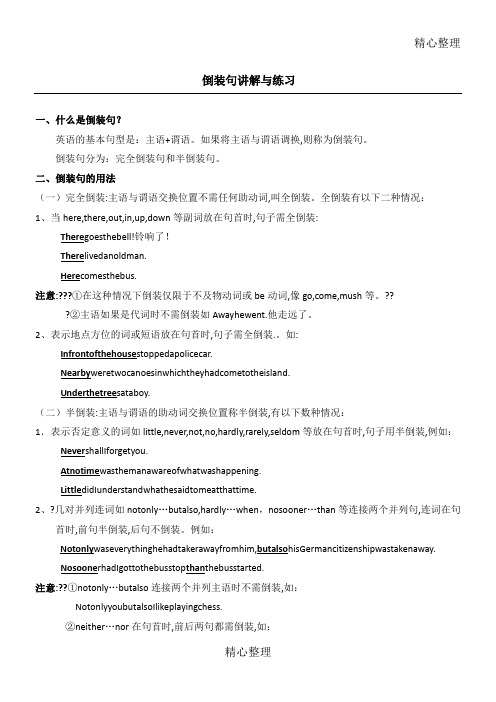
精心整理倒装句讲解与练习一、什么是倒装句?英语的基本句型是:主语+谓语。
如果将主语与谓语调换,则称为倒装句。
倒装句分为:完全倒装句和半倒装句。
二、倒装句的用法1注意212、?时,前句半倒装,后句不倒装。
例如:Notonly waseverythinghehadtakerawayfromhim,butalso hisGermancitizenshipwastakenaway.Nosoone rhadIgottothebusstop than thebusstarted.注意:??①notonly…butalso连接两个并列主语时不需倒装,如:NotonlyyoubutalsoIlikeplayingchess.②neither…nor在句首时,前后两句都需倒装,如:Neither doIhaveasister nor doesmyhusband.3、only放在句首强调状语时,主句用半倒装。
例如:Onlythen didIrealizethatIwaswrong.Onlyinthisway canIlearnfrommyfault.Onlywhenthewarwasoverin1918washeabletogetbacktowork.注意:only强调主语不倒装:如Onlytheteacherscanusetheroom.4、so…that句型,so放在句首时,主句用倒装结构,that从句不用倒装。
例如:5.倒装句练习题1.HismotherhadtalkedtohimformanyminuteswhilehewaswatchingTV,but____.A.alittledidhehear??B.littledidhehear??C.littleheardhe??D.alittleheardhe2.——Hello,ZhuHua.I’llhavetoreturntoCanadabecauseI’veworkedhereforayear. ——_____!A.Whattimeflies??B.Howtimeflies??C.Whatdoestimefly??D.Howdoestimefly3.Duringthewar,____butalsohelosthiswifeandhischild.4.6.10.——Whatsportdoyoulikebest?——Springboarddiving(跳板跳水).___todiveintowaterfromhighboard!A.Whatafunisit??B.Howfunitis??C.Howafunisit??D.Whatfunitis11.——Theoldmanwouldn’tstayathomeforarestevenifitrained.——____.Hewouldfeelsickifhestayedhomeforoneday.A.Sowouldmygrandpa???B.Sowouldn’tmygrandpaC.Neitherwouldmygrandpa??????D.Norwouldn’tmygrandpa12.___forustosurf(冲浪)ontheseainsummer!A.Whatexcitingisit??B.Howexcitingisit?C.Whatexcitingitis??D.Howexcitingitis13.Bynomeans___toourplanforthetrip.A.willsheagree??B.shewillagree??C.agreesshe??D.willagreeshe14.Thechildtiptoed(翘起脚尖走)quietlytothebird.___intotheforestwhenhewasabouttocatchit.A.Flewitaway??B.Awayflewit??C.Awayitflew??D.Flewawayit16.18.21.A.liesaverydeepvalley??B.doesaverydeepvalleylieC.averydeepvalleylies??D.averydeepvalleylays23.Theywentintoasmallhousebut___.A.nopersonsdidtheyfind????????B.notapersonfoundtheyC.notapersondidtheyfind???????D.notapersontheyfound24.——Mymotherdoesalotofhouseworkbeforegoingtowork,butshehasneverbeenlate.——_____.A.Sodoesmymother?B.Neitherdoesmymother?C.Norhasmymother?D.Soitiswithmymother25.Everyonehasarrivedateightand____.A.thendoesthemeetingbegin??B.thenbeginsthemeetingC.beginsthemeetingthen???????D.doesthemeetingbeginthen26.__itisforustoseethathedoeshisworksowell!28.30.33.MothertoldRosetobuysomesugarinthesupermarketand___.A.shedidso????B.soshedid??????C.sodidshe???????D.shedidsuch34.___shortlyafteritstoppedraining.A.Thereappearedacolorfulrainbowinthesky?B.IntheskydidacolorfulrainbowappearC.Thereacolorfulrainbowappearedinthesky?D.Thereintheskyacolorfulrainbowappeared35.Afterthepatientswentintotheoffice,__working.A.onlyadoctordidtheysee???B.onlyadoctorsawtheyC.onlyadoctortheysaw???????D.onlyadoctorhadtheyseen36.Wehavelookedforthelostsheepalmosteverywhere,butnowhere_____.A.wecanfindit???B.canwefindit???C.canfindweit???D.wecanitfind37.Onlysincetheygaveupthatgoodchance___toshowtheirinventionagain.39.40.A.sodoI????B.sowillI???C.nordoI???D.norwillI44.Sinceeveryonehascomebackhere,___.A.ongoesourdiscussion?????B.goesonourdiscussionC.ondoesourdiscussiongo??D.doesonourdiscussiongo45.__whenwepassedbyitsnest.A.Upintotheblueskydidthebirdfly?????B.UpintotheblueskythebirdflewC.Upintotheblueskyflewthebird????????D.Flewupintotheblueskythebird参考答案及讲解1.B。
英语倒装句及其解题技巧及练习题(含答案)含解析
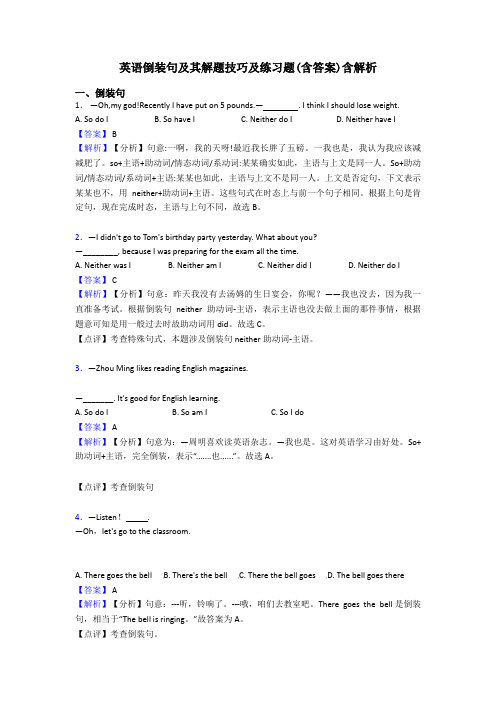
英语倒装句及其解题技巧及练习题(含答案)含解析一、倒装句1.—Oh,my god!Recently I have put on 5 pounds.—. I think I should lose weight.A. So do IB. So have IC. Neither do ID. Neither have I【答案】 B【解析】【分析】句意:一啊,我的天呀!最近我长胖了五磅。
一我也是,我认为我应该减减肥了。
so+主语+助动词/情态动词/系动词:某某确实如此,主语与上文是同一人。
So+助动词/情态动词/系动词+主语:某某也如此,主语与上文不是同一人。
上文是否定句,下文表示某某也不,用neither+助动词+主语。
这些句式在时态上与前一个句子相同。
根据上句是肯定句,现在完成时态,主语与上句不同,故选B。
2.—I didn't go to Tom's birthday party yesterday. What about you?—________, because I was preparing for the exam all the time.A. Neither was IB. Neither am IC. Neither did ID. Neither do I【答案】 C【解析】【分析】句意:昨天我没有去汤姆的生日宴会,你呢?——我也没去,因为我一直准备考试。
根据倒装句neither助动词-主语,表示主语也没去做上面的那件事情,根据题意可知是用一般过去时故助动词用did。
故选C。
【点评】考查特殊句式,本题涉及倒装句neither助动词-主语。
3.—Zhou Ming likes reading English magazines.—_______. It's good for English learning.A. So do IB. So am IC. So I do【答案】 A【解析】【分析】句意为:—周明喜欢读英语杂志。
倒装句及50道练习题(含答案)
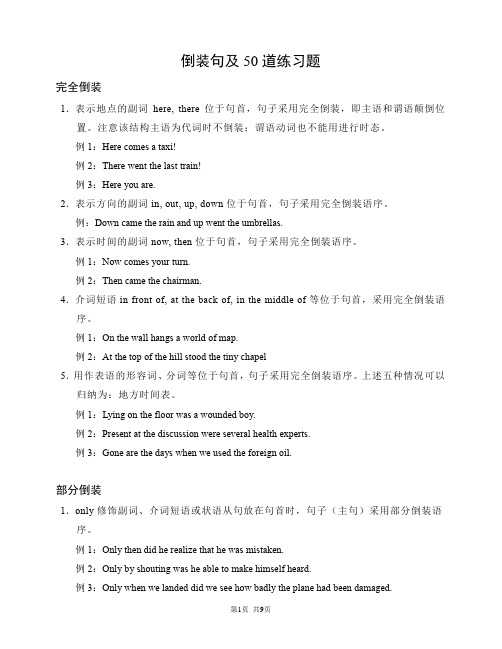
倒装句及50道练习题完全倒装1.表示地点的副词here, there位于句首,句子采用完全倒装,即主语和谓语颠倒位置。
注意该结构主语为代词时不倒装;谓语动词也不能用进行时态。
例1:Here comes a taxi!例2:There went the last train!例3:Here you are.2.表示方向的副词in, out, up, down位于句首,句子采用完全倒装语序。
例:Down came the rain and up went the umbrellas.3.表示时间的副词now, then位于句首,句子采用完全倒装语序。
例1:Now comes your turn.例2:Then came the chairman.4.介词短语in front of, at the back of, in the middle of等位于句首,采用完全倒装语序。
例1:On the wall hangs a world of map.例2:At the top of the hill stood the tiny chapel5.用作表语的形容词、分词等位于句首,句子采用完全倒装语序。
上述五种情况可以归纳为:地方时间表。
例1:Lying on the floor was a wounded boy.例2:Present at the discussion were several health experts.例3:Gone are the days when we used the foreign oil.部分倒装1.only修饰副词、介词短语或状语从句放在句首时,句子(主句)采用部分倒装语序。
例1:Only then did he realize that he was mistaken.例2:Only by shouting was he able to make himself heard.例3:Only when we landed did we see how badly the plane had been damaged.2.so/such….that…句型位于句首时,主句部分采用倒装语序。
(完整版)倒装句精讲及练习(含答案)

倒装句的用法英语倒装句分为两种:1、整个谓语在前的句子,叫完全倒装。
Here comes the car.2、部分谓语(情态动词、助动词、连系动词)在前,谓语的主体部分仍在主语之后的句子,叫部分倒装句。
Only then did he realize that he was wrong.必须弄清的两点:①若有主从句,哪句倒装。
②部分倒装还是完全倒装。
一、表示方位和时间的副词位于句首时(now ,then here ,there,out ,in ,up,down ,away ,back,off,on ), 句子全部倒装。
注:主语是代词时,不倒装。
(如 5,6)1.Here comes the bus .2.There goes the bell .3.Away went the students .4.Now comes the chance .Out rushed the children. he rushed.There comes the bus. 注意: 1.不能用进行时;he comes.2. 主语为人称代词时不倒装。
二、以介词短语表示的状语,提前位于句首时,全部倒装。
1.In a lecture hall of a university in England sits a professor .2.In front of our school stands a tower .3.By either side of the river grow a lot of apple trees .4.At the top of the mountain stands a temple .5. Among the goods are Christmas trees,flowers and toys.三、表语位于句首时,倒装结构为“表语+连系动词 +主语”A:形容词 +连系动词 +主语例 1.Present at the meeting were Professor White,Professor Smith and many other guests. 例 2.过去分词 +连系动词 +主语Gone are the days when they could do what they liked to the Chinese people.四、将 so\neither \nor 放在开头 ,表示“ 也 (不 )”的意思时 ,部分倒装注: 表示“确实是这样”时 ,不倒装1.He went to the film last night.So did I .2.You must finish your work ,so must I .3.She is interested in the story ,so am I .4.He didn ’ t turn up .Neither did his brother .5.His mother told him not to go to the film .So he did.五、在 if 条件 :在 if 条件句中 ,通常可以省略条件句 ,必须含有系动词if , 而将从句倒装were,助动词had 和情态动词should1.Were he younger(=If he were younger ),he would learn skating .2.Should they forget (=If they should forget ) to bring a map with them ,they would get lost inthe woods .3.Had they realized (=If they had realized ) how important the task was ,they wouldn ’ t have refused to accept .4.Were I you ,I would help her .六、否定词或半否定词(never .little ,seldom ,not ,nowhere ,scarely ,few ,by no means ,at no time ) 位于句首 ,应部分倒装1.Never have I been there .2.Little did I know about it .3.Seldom did she come late to school .4.Not a single mistake did he make .5.By no means should you buy that kind of car .七、以 not until,no sooner than , hardly when ,not only but also 所引导的状语放在句首时 ,需要部分倒装1.Not until 10 ’clock will the library open .2.No sooner had I gone out than he came to see me .3.Hardly had the train arrived when I ran to meet my friend.4.Not only does she speak English but also she follows the British way of life .八、 only及其修饰的状语位于句首时,后面的句子部分倒装。
英语倒装句讲解与练习

倒装句1.部分倒装部分倒装是指把谓语的一部分(助动词、系动词或情态动词)置于主语之前(一般疑问句语序)。
这类句型主要有以下几种形式:(1)当否定词或带有否定意义的词或短语位于句首时,常用部分倒装。
这类词或短语有:little, few, never, seldom, rarely, by no means, not only, not until, at no time, under/in no circumstances, in no case, in no way, no sooner, hardly, scarcely等。
(2)当only修饰的副词、介词短语或状语从句位于句首时,用部分倒装。
Only when you can find peace in your heart will you keep good relationships with others.只有当你找到内心的平静时你才能与他人保持良好的关系。
(3)so/neither/nor置于句首时,用部分倒装。
①“so+be/助动词/情态动词+主语” 表示前面所说的肯定情况也适合于另一人或物,意为“……也是如此” 。
—I’ve got an enormous amount of work to do.——我有大量的作业要做。
—So have I.——我也如此。
②“neither/nor+be/助动词/情态动词+主语” 表示前面否定的内容也适用于另一人或物,意为“……也不这样” 。
My friend wasn’t happy,neither was I.(4)在so/such... that... 结构中,当“so+形容词/副词” 或“such+名词” 位于句首时,用部分倒装。
So suddenly did he catch the disease that the whole family were at a great loss. 他突然患病,全家人全然不知所措。
最新英语倒装句常见题型及答题技巧及练习题(含答案)
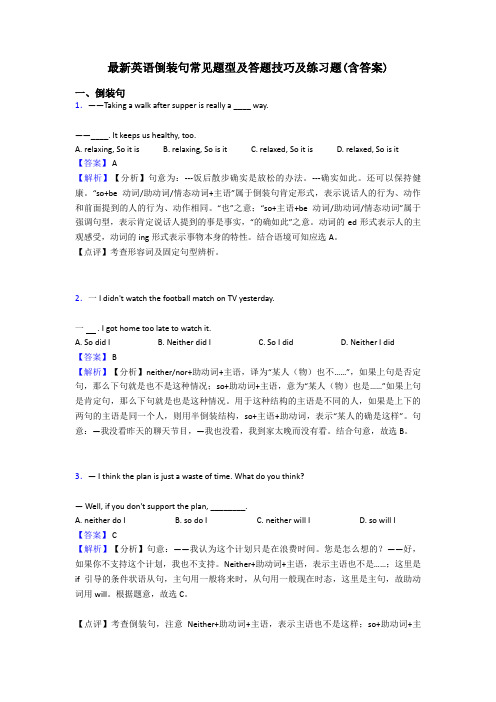
最新英语倒装句常见题型及答题技巧及练习题(含答案)一、倒装句1.——Taking a walk after supper is really a ____ way.——____. It keeps us healthy, too.A. relaxing, So it isB. relaxing, So is itC. relaxed, So it isD. relaxed, So is it【答案】 A【解析】【分析】句意为:---饭后散步确实是放松的办法。
---确实如此。
还可以保持健康。
“so+be动词/助动词/情态动词+主语”属于倒装句肯定形式,表示说话人的行为、动作和前面提到的人的行为、动作相同。
“也”之意;“so+主语+be动词/助动词/情态动词”属于强调句型,表示肯定说话人提到的事是事实,“的确如此”之意。
动词的ed形式表示人的主观感受,动词的ing形式表示事物本身的特性。
结合语境可知应选A。
【点评】考查形容词及固定句型辨析。
2.一 I didn't watch the football match on TV yesterday.一 . I got home too late to watch it.A. So did IB. Neither did IC. So I didD. Neither I did【答案】 B【解析】【分析】neither/nor+助动词+主语,译为“某人(物)也不……”,如果上句是否定句,那么下句就是也不是这种情况;so+助动词+主语,意为“某人(物)也是……”如果上句是肯定句,那么下句就是也是这种情况。
用于这种结构的主语是不同的人,如果是上下的两句的主语是同一个人,则用半倒装结构,so+主语+助动词,表示“某人的确是这样”。
句意:—我没看昨天的聊天节目,—我也没看,我到家太晚而没有看。
结合句意,故选B。
3.— I think the plan is just a waste of time. What do you think?— Well, if you don't support the plan, ________.A. neither do IB. so do IC. neither will ID. so will I【答案】 C【解析】【分析】句意:——我认为这个计划只是在浪费时间。
- 1、下载文档前请自行甄别文档内容的完整性,平台不提供额外的编辑、内容补充、找答案等附加服务。
- 2、"仅部分预览"的文档,不可在线预览部分如存在完整性等问题,可反馈申请退款(可完整预览的文档不适用该条件!)。
- 3、如文档侵犯您的权益,请联系客服反馈,我们会尽快为您处理(人工客服工作时间:9:00-18:30)。
倒装句英语句子的语序通常是主语在前,谓语在后,这种语序称作正常语序或自然语序。
但有时出于语法或达到某种修辞目的(强调、承上启下、平衡等)的需要,要把谓语动词放在主语前面,这种语序称作倒装(Inversion)语序。
将谓语动词完全移至主语之前,称完全倒装(Full Inversion);如果只是把助动词或情态动词放在主语之前,称为部分倒装。
1. there be结构的倒装在“there be 或there + appear to be, come,exist happen to be, lie, live, occur, remain, seem, seem to be stand, used to be等结构中,倒装形式为完全倒装。
如:There were many stude nts in the read ing room in this eve ning.There is a TV set, a stereo system and a nu mber of chairs in the sitti ng room.There seems to be a lack of com muni cati on.There remained a few jobs still to be finishedThere sta nd a line of guards in front of the gate.2. here, there, now, then, thus等引起的倒装在以here, there, now, then等简短副词引起的句子中(前三个须用一般现在时),动词往往是be, come, go, run, lie 等,这类句子大多带有引起注意的含义。
如:Here comes the bus.公共汽车来了。
Here is the letter you have been looking forward to. 你久盼的信在这儿。
There goes the bell.但要注意:如果主语是代词,则不用倒装。
如:Here they are.他们在这儿。
3. 省略if的非真实条件状语从句中的倒装在虚拟结构中,条件从句的谓语含有were, had和should这三个词是,可省去if,将这些词移至主语之前。
Had I time ( = If I had time ) , I would go and help you.Were I you (= If I were you ) , I would go abroad.Should he come (=If he should come ) , tell him to ring me up.Had you worked harder at college, you would have got better job.Were he better qualified, he would apply for the positi on.4. 副词so, neither, nor等引起的倒装在用so, nor, neither表示也/不..... "这一类结构里其公式是:肯定:so + be / have助动词/情态动词+主语精品文档否定: Neither(nor)+be/have /助动词/情态动词+主语。
如:—He has been to Beiji ng.他去过北京。
一So have I.我也去过。
—They can ' t answer the quest他们不会回答这个问题。
一Neither than I.我也不会。
5. what,how 引起的倒装以What, how 开头的感叹句(表语或宾语提前)。
如:What beautiful weather (it is)! 多好的天气啊!(表语提前)What a lovely picture he painted! 他画了一张多好的画啊!(宾语提前)6. 疑问词或连接词引起的倒装在疑问词或连接词whether 等引起的从句中。
如:Whatever you may say, I won ' t无论你怎样说,我都不会去那儿。
(状语从句中宾语提前)What book he wants is not clear. 他要什么书还不清楚。
(主语从句中宾语提前)7. 否定词位于句首时引起的倒装(1). never,seldom,hardly,little,few 等引起的倒装否定词never,seldom,rarely,hardly,barely,scarcely,little,few 等位于句首时所引起的倒装句通常为部分倒装形式,如果谓语动词为be的一般现在时或一般过去时,则为完全倒装形式。
如:Never shall I forget the days when you were with us.Little does he realize how important this meeting is. 他对这个会议的重要性不甚了了。
Never/Seldom has there been so much protest against the Bomb.(2) . nowhere, no longer, no more等引起的倒装nowhere(无处),no Ionger(不再),no more(也不)等否定词位于句首时所引起的倒装句通常为部分倒装形式,如果谓语动词为be 的一般现在时或一般过去时,则为完全倒装形式:No Ionger was he in charge of this work. 他不再负责这项工作了。
Nowhere is drug abuse more of a probIem than in the US.'She didn't know the reason for his Ieaving.' ' No more do I (=neither do I).'(3) . not until,not a,not in the least等引起的倒装not until(直至U . 才),not a(—个... 也没有),not in the leas'—点儿也不),not for a minute/momen t(—点儿也不)等位于句首时,通常引起倒装(not a之后的名词作主语时除外),其形式通常为部分倒装形式,如果谓语动词为be 的一般现在时或一般过去时,则为完全倒装形式。
如:Not untiI aII the demands had been turned down did the workers decide to go on strike. 一直至所有的要求遭至拒绝之后,工人们才决定罢工。
Not once did he taIk to me. 他一次也没有和我谈过。
精品文档Not a word did he say. 他一句话也没说。
Not in the least am I afraid of you any more.(4). under no circumstances,by no means,in no way,at no time 等引起的倒装in/under no circumstance^无论如何不),by no means(决不),in no case(无论如何不),in no way (决不),on noaccount (决不可),on no condition(决不),at no time (永不…,在任何时候都不)等短语位于句首时所引起的倒装句通常为部分倒装形式,如果谓语动词为be 的一般现在时或一般过去时,则为完全倒装形式。
如:In no case must force be resorted to. 决不准许诉诸武力。
By no means is it true that all English people know their own language well. 绝非所有的英国人都通晓本国语。
At no time did anyone involved speak to the press.Under no circumstances would he change his mind.Under no circumstances should you lend him any money. 你无论如何都不该把钱借给他。
On no account must you accept any money if he offers it. 他如要给你钱,你可绝不能接受。
In no case should you give up. 你绝不能放弃。
On no condition should we tell her about it. 我们绝不能把此事告诉她。
No way will I go on working for that man. 我再也不给那个人工作了。
8. 关联连词位于句首时引起的倒装(1) . not only...but also引起的倒装not only...but also位于句首所引起的倒装句为部分倒装形式,如果谓语动词为be的一般现在时形式或一般过去时形式,则为完全倒装形式。
如:Not only should we not be afraid of difficulties, but also we should try our best to overcome them.我们不仅应该不怕困难,而且应该尽最大努力去克服它们。
Not only did he come, but he saw her. 他不仅来了,而且还见到了她。
Not only does she speak Spanish,(but) she also knows how to type. 她不但会说西班牙语,还会打字呢。
Not only is he a teacher, but he is also a poet. 他不仅是一位教师,而且是一位诗人。
Not only did he speak more correctly, but he spoke more easily. 不仅他讲得更正确,也讲得更不费劲了。
Not only did they present a musical performance, but they also gave a brief introduction to the history of Western brass instruments. 他们不但做了音乐表演,而且简短地介绍了西方铜管乐器的历史.(2) . neither…nor引起的倒装neither...nor位于句首引起的倒装句为部分倒装形式,如果谓语动词为be的一般现在时或一般过去时,贝U为完全倒装形式。
